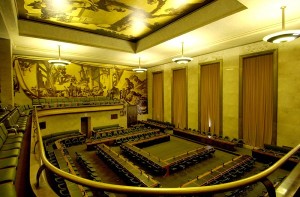 (Image Source: The United Nations Office at Geneva)
(Image Source: The United Nations Office at Geneva)
By Rob Golan-Vilella
Two weeks ago, some eyebrows were raised when North Korea assumed the rotating presidency of the Conference on Disarmament (CD). Observers mocked the idea that North Korea—an international pariah state that in the past decade has withdrawn from the NPT and conducted two nuclear tests—could become the president of an organization whose mission is to negotiate agreements relating to nuclear disarmament.
This week, Canada responded to this news by announcing that it will boycott the current session of the CD until Pyongyang's turn as its chair ends next month. As Canada's Foreign Minister John Baird said:
It's just absurd to have [North Korea] in the chair... The regime is a major proliferator of nuclear weapons and its noncompliance with its disarmament obligations goes against the fundamental principles of this committee.
This is a principled—perhaps an even admirable—stance. No one should be happy to see Pyongyang presiding over the CD. But the problems that the CD faces today go far beyond North Korea's temporary stint as its president.
Indeed, as Baird himself noted, Canada's move was essentially a "symbolic" one. This is for a simple reason: the CD has not completed any substantial work since concluding the Comprehensive Test Ban Treaty in 1996. For the past 15 years it has been stalled; in May 2009 it agreed to a work plan for the first time in a decade, but ever since it has been unable to move forward on it.
The CD's 2009 work plan contained four elements, the most prominent of which was to negotiate a verifiable fissile material cutoff treaty (FMCT), which would end the production of fissile material for nuclear weapons. Negotiating an FMCT is a vital component of U.S. and global efforts to reduce nuclear dangers worldwide.
Yet because the 65-nation CD operates by consensus, a single nation can block progress at the CD. Unfortunately, since 2009 Pakistan has done exactly that, refusing to allow negotiations on an FMCT go forward. As a recent Arms Control Today interview with the outgoing Chinese president of the CD makes clear, the status quo appears unlikely to change, meaning that North Korea's brief period as the CD's president will probably be no different from the months right before it or after it.
Assistant Secretary of State Rose Gottemoeller has said that America's patience on the FMCT is "drawing a bit thin," but the United States has done little to outline a way forward if the deadlock persists. It is high time for Washington to turn to other options, as ACA's Daryl Kimball argued last fall:
If the CD cannot begin work by the end of its first session next year, the United States should pursue parallel, open-ended talks involving the eight states with fissile production facilities that are not legally required to be under IAEA safeguards, as well as representatives from other key states.
In short, the tragedy of this story is not that North Korea's weeks-long turn as president of the CD will have a meaningful negative impact on the work produced by the conference. The real tragedy is that the CD as an institution is so broken that in all likelihood it will have no impact at all. The United States and other interested nations should find ways to move forward on the FMCT that do not involve trying to break the decade-long deadlock at the CD – no matter which country happens to be chairing it.
